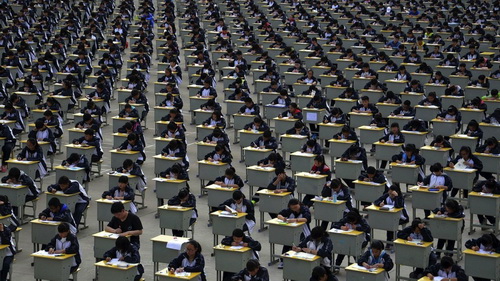Driving to work this morning I was pondering a statement that I often hear when working with Chinese families – “there are too many Chinese students at that school!” As I thought about that and other comments parents say, “it is too competitive” or “I only want my child to go to X” or even “if my child goes to an unknown school how will they be able to come back to China to work?” These and other statements flow along similar lines and the fact of the matter is – Yes! There are lots of Chinese students, everywhere! In fact, from a boarding school perspective there are now, perhaps, too many Chinese students. But from another point of view, and this is the point of my article, what is actually too many?
One of the main reasons families want to send their children abroad, beside the pollution factor, is for the different educational experience. More and more families are seeking the perceived advantage of attending school outside China in hopes of gaining an education that will prepare them for a bright and promising future. The reality is there are now over 300,000 Chinese students studying in the US making up approximately 30% of all international students. Finding a school with few Chinese students is rare and if they do not have many Chinese students it is usually because they have not been “found” yet.
As I thought about the comment of “too many” students I realized that this is not, for all intents and purpose, a bad thing at all. In fact, there are some benefits that may be unperceived. But to get to that point of view, we must take a few assumptions into consideration. First, we need to assume that most of the students attending X School are hard working and taking advantage of the educational opportunities offered. By educational opportunities, everything from academics to sports and other programs that develop character and eventual success. Second, we need to assume that the student wants to a.)be successful and b.) they are eager to learn. And third, the student will make life long friends, not just among the American students but also the Chinese and other international students attending that school.
Let’s take a look at a particular school – The Ross School on Long Island in New York. Ross has an amazing academic program, one that is revised on an annual basis to ensure the most up to date practices and information. Their approach offers practical learning combined with project based learning to inspire students to truly engage their learning. They have many other attributes including a world-class tennis program and in house research program. Chinese families often overlook this school because the school has a large number of Chinese students and non-conventional housing. But the fact is that Ross is a true leader in education and though for a short history has amazing college acceptance results. There are other schools with amazing programs – The Knox School to name another. My point here is that it is truly important to consider all factors in choosing a school. Ranking does not and cannot unveil the unique qualities a school offers.
We could talk for a moment about the challenges of integrating into the culture of the school and American society but that is an enormous challenge. Total integration is impossible due to something mentioned before and what I call the 5000-mile gap of language, culture (school, town, region, etc…) educational system and other increments of being a student in a foreign country. These are often overlooked in the research and application process, but cannot be dismissed, as they are key factors in understanding learning abroad. But putting that aside, let’s look at the human factor of living, working and studying with like minded students as detailed above.
One of the unique benefits of attending a “good” school is the network one builds over the four years attending boarding school or university. Whether that network is made up of American or Chinese students, the fact of the matter is they are the building blocks of a network, which will serve to march forward into one’s future career. Lots of students write in their essays that want to work with the “elite” and while I have no idea what that really means, developing one’s own success is incumbent on developing skills necessary to be successful. These skills are of course partially academic, but also personal and social. Several years ago it was pointed out to me that many years ago families from India had the same concerns Chinese now pose – if my child goes to a school I have never heard of, how will they be successful? Well it all comes down to the social network and in this case the Chinese social network one develops in the primary years of either high school or university.
If we go back to the basic assumptions posted above, what then is the problem of having too many Chinese students? If those same students are working hard to be successful, growing and developing solid skills in preparation for university or a career, then that same network will be part of the reason for success once that student returns to China. They will be the same people who come back and are in positions to hire, build new companies, develop new technologies and add to the future growth of China.
So by looking at the fact that “there are too many Chinese students” undermines the whole process of education abroad. First, there are, as mentioned very few schools with hardly any Chinese students. So rather than look at this factor as a negative, embrace it as a positive. What does too many students mean? Not much unless one is only looking at the limitations rather than the overall possibilities.
Photo: qzprod.files.wordpress.com




